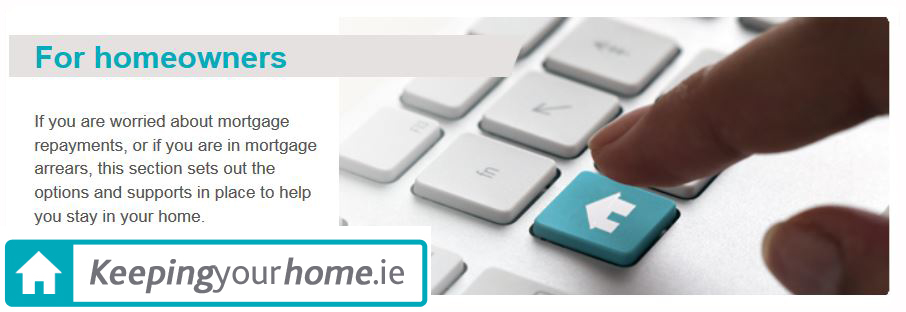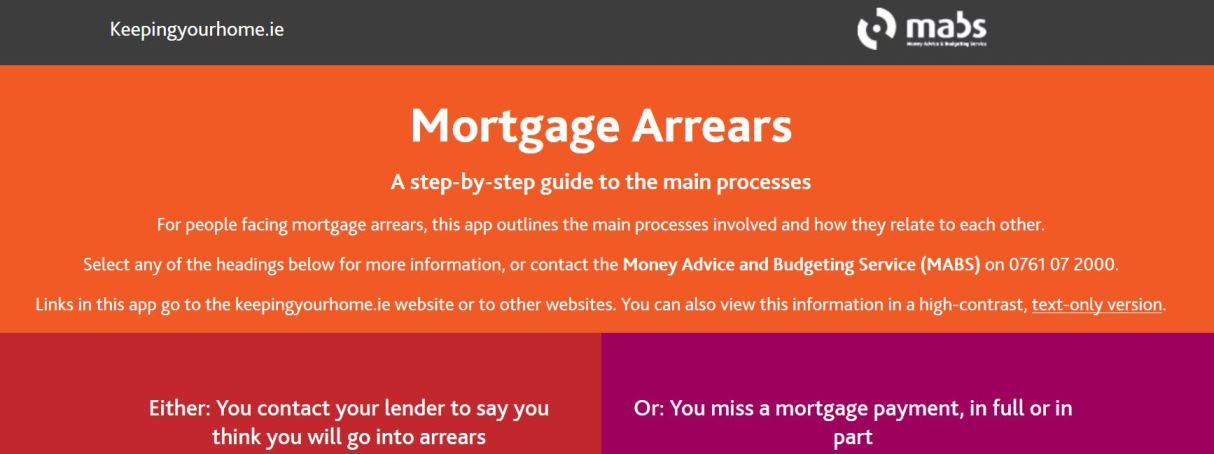
Helpful Information
Keeping Your Home
About keepingyourhome.ie
Keepingyourhome.ie is provided by the Citizens Information Board and the Money Advice and Budgeting Service (MABS).
The website aims to provide comprehensive information on the services and entitlements available if you are having difficulties paying your rent or making your mortgage repayments.
Keepingyourhome.ie is based on content from the citizensinformation.ie website and the Money Advice and Budgeting Service website, mabs.ie.
Overview: For homeowners
Many people are finding it difficult to keep up with mortgage repayments or are in mortgage arrears.
If you think you are likely to fall behind in your mortgage payments, the most important step you can take is to contact your lender as soon as possible.
Where to get advice and help
If you find yourself having difficulty with mortgage repayments, there are several sources of advice and help available.
MABS, the Money Advice and Budgeting Service, can advise you on dealing with mortgage arrears as well as other forms of problem debt. The MABS helpline 0761 07 2000 is open from 9am to 8pm, Monday to Friday. The Mortgage Arrears Information Helpline is now operated by MABS and is available either at 0761 07 4050 or through the MABS helpline.
MABS also operates a nationwide network of centres, staffed by specialist money advisers, as well as an This email address is being protected from spambots. You need JavaScript enabled to view it. .
You can also contact your local Citizens Information Centre for face-to face information and advice, phone the Citizens Information Phone Service on 0761 07 4000, Monday to Friday, 9am to 8pm.
Mortgage arrears: contacting your lender
The most important thing to do if you think you are likely to fall into mortgage arrears is to contact your mortgage lender and let them know the situation. Our document on mortgage arrears gives some information on your options.
Mortgage arrears and consumer protection codes
Lenders must abide by specified codes of conduct in dealing with people who have problems paying their mortgage. These codes of conduct provide protection for borrowers. Read more in our document on mortgage arrears and consumer protection codes.
The Mortgage Arrears Resolution Process (MARP)
Under the Central Bank's Code of Conduct on Mortgage Arrears (CCMA), lenders must operate a Mortgage Arrears Resolution Process (MARP) with customers who are in mortgage arrears or who are likely to fall into mortgage arrears (pre-arrears). Read more about the steps involved in the MARP.
Alternative repayment arrangements
After assessing your situation under the Mortgage Arrears Resolution Process, your lender may offer you an alternative repayment arrangement - often called a mortgage restructure. Read more about the types of arrangements available and some points to consider when assessing the offer.
Initiatives on mortgage arrears and personal debt
The interlinked problems of mortgage arrears and personal debt have given rise to a series of initiatives. Find out more about these responses, which include new personal insolvency options and easier access to bankruptcy.
Mortgage interest supports
Tax relief on mortgage interest payments is no longer available for mortgages taken out after 31 December 2012, but if your mortgage started before this date, you are probably already claiming the relief. Find out more about mortgage interest relief.
The Mortgage Interest Supplement scheme has been closed to new applicants since 1 January 2014 and is being wound down over a 4-year period.
Mortgage protection and mortgage repayment policies
Most private residential mortgages are covered by a mortgage protection policy, which comes into play in the event of your death. You may also have a mortgage repayment policy or some other form of insurance that offers financial support if you lose your job or otherwise experience a fall in income. Read more about insurance protection on mortgages.
Rent-a-room scheme
You may be able to earn some extra income to help with your mortgage repayments if you have a spare room or rooms in your home. Under the Rent-a-room scheme, if you rent out a room (or rooms) in your own home to private tenants, up to €12,000 of your rental income in any tax year will be exempt from income tax, subject to certain conditions.
Selling your home and voluntary surrender ('handing back the keys')
If you sell your home and the sale does not cover the outstanding mortgage on the home, you should note that you will still owe the difference to the lending institution. Find out more about some of the implications if you sell or voluntarily surrender your home.
Mortgage-to-rent scheme
Under the national mortgage-to-rent scheme, people who are having trouble paying their mortgages can switch from owning their home to renting their home as social tenants. If you take up the mortgage-to-rent option, you will no longer own your home or have any financial interest in it.
Repossession procedures
As a last resort, the lender may end up going through the legal process of repossessing your home. We give some information on what to do if you lose your home.
You may be finding it hard to keep up with your rent. If you are in this situation, there are several sources of information, advice and help.
Where to get advice and help
Threshold provides an independent advisory and advocacy service, which is free and confidential. You can contact Threshold if you are having problems with your landlord.
Threshold’s Tenancy Protection Service is available in Dublin and in the Cork city area to private tenants whose tenancy is at risk. This service can refer tenants to the Department of Social Protection for review of their Rent Supplement where appropriate – Freefone 1800 454 454.
MABS, the Money Advice and Budgeting Service, provides information and advice on dealing with rent arrears as well as other forms of problem debt. The MABS helpline 0761 07 2000 is open from 9am to 8pm, Monday to Friday.
You can also contact your local Citizens Information Centre for face-to face information and advice, phone the Citizens Information Phone Service on Lo-call 0761 07 4000, Monday to Friday, 9am to 8pm, or log on to the Citizens Information website.
For people renting privately
Rent Supplement is a payment from the Department of Social Protection for people living in private rented accommodation who cannot afford to pay the full rent themselves. In general, if your only income is a social welfare payment, you will qualify for a Rent Supplement. However, if you or your partner is in full-time employment (30 hours a week or more) you will not qualify for this payment.
If you are getting Rent Supplement and you are at risk of losing your home due to a proposed rent increase, there is support available. Contact your local office that administers the Supplementary Welfare Allowance Scheme, which includes Rent Supplement, as soon as possible. If you are living in the Dublin area or in Cork city, you can contact the Tenancy Protection Service, which is run by Threshold (see above).
A new Housing Assistance Payment (HAP) is being introduced. This will eventually replace long-term Rent Supplement. People who are getting HAP may take up full-time employment, subject to the conditions of the HAP scheme.
Most private tenants have specific rights under the Residential Tenancies Act 2004. One of the main rights under this Act is security of tenure. However, if you are sharing accommodation with your landlord or living in student accommodation let by a recognised educational institution, you are not covered by this legislation.
Read more about the rights and obligations of tenants and of landlords.
If you are paying tax on your income, you may be entitled to claim tax relief on your rent - but only if you were already renting on 7 December 2010.
For social housing tenants
People who are renting from a local authority pay what is called a "differential rent", which is calculated on the basis of ability to pay. If your income is reduced, you should immediately ask your local authority to adjust your rent downwards.
Housing associations also take your income into account when calculating your rent. You should contact your landlord about reducing your rent if you are a tenant of a housing association or co-operative and your income has been reduced.
If you find that you are falling into arrears with your rent, contact your landlord straight away.
 Losing your home
Losing your home
Whether you are renting from a private landlord, a local authority or a housing association, they can evict you if you fall behind with the rent, provided they follow the correct procedure. This is usually their very last resort. Private landlords must comply with the rules set down in the Residential Tenancies Act 2004, which include giving proper notice. Social landlords, such as local authorities and housing associations, have different procedures. Here we describe what to do if you lose your home.
For more details please visit keepingyourhome.ie


Comments